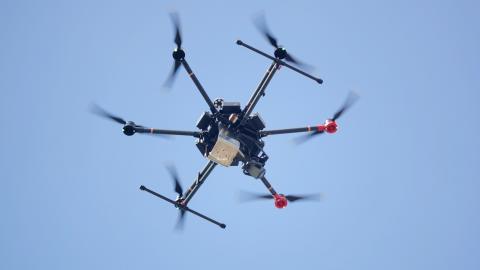On her recent trip to Beijing, Treasury Secretary Janet Yellen explained to her Chinese hosts that the United States, like the Chinese government, prioritizes national security imperatives over commercial considerations. The U.S. therefore keeps import and export restrictions on trade with the People’s Republic of China (PRC) despite their economic costs. The same considerations should lead Congress to pass legislation like the American Security Drone Act to prohibit federal government agencies from buying or using drones supplied by regimes hostile to the U.S.
As in many sectors, Chinese companies dominate the global market for unmanned aerial systems (UAS). Propelled by a large domestic market, lavish government subsidies, cheap labor and components, loosely enforced environmental and safety regulations, and a willingness to shave initial profits to raise barriers of entry to competitors, Chinese firms such as Da Jiang Innovations (DJI) and Autel Robotics have become the primary source of drones in the U.S. and other countries.
The overreliance on Chinese-manufactured drones threatens Americans security. The ruling Communist Chinese Party (CCP) keeps all large Chinese tech companies on a short leash. Not only are many of their executives obliged to obey CCP directives, but Chinese law empowers government security organs to demand access to any Chinese companies’ data at any time.
Recognizing these dangers, federal, state and other U.S. leaders, on a bipartisan basis, have tried to reduce this threat. The Departments of Defense, Commerce and other federal agencies have applied partial restrictions on using government funds to acquire and use Chinese-made drones. More and more state governments have been following suit. In addition, Congress has been holding accountable corporations that are complicit in China’s human rights violations. The Chinese Communist Party has used DJI drones to police Uyghur concentration camps and support Russian military operations in Ukraine.
These countermeasures will take time to execute. Even so, some analysts, while acknowledging the dangers of so many Americans being so reliant on Chinese drones, despair of escaping this vice anytime soon.
Those who consider this reliance on Chinese-made drones acceptable have made some questionable assertions and conclusions. For example, it is false to claim that a March 2020 study by the consulting firm Booz Allen Hamilton gave DJI drones a clean bill of cyber health.
That study involved only a limited evaluation of platforms and threats, acknowledging that “this framework should not be considered a comprehensive analysis of all cybersecurity risks for any platform.” The study also did not analyze “customized exploits, such as reverse engineering,” and recommended further testing of file transfer protocol vulnerabilities. Above all, the study warned that, “An adversary with malicious intent could potentially utilize this service to exfiltrate data, manipulate configuration, or upload custom software.”
In practice, even amateur hobbyists have been able to hack DJI drones to disregard electronic fences against entering restricted airspace, such as the no-fly zones around Washington, and negate other safety and security restrictions. Indeed, security researchers have been able to access sensitive data about the drones’ clients, including in the U.S. military and government, and their activities. This March, a bipartisan group of senators urged the U.S. Cybersecurity and Infrastructure Security Agency to assess the security vulnerability of potential DJI mapping of U.S. critical infrastructure.
Chinese drones may currently dominate the market, but that could change. The U.S. and its Western allies are designing and developing an increasing variety of drones — hundreds of which are helping defend Ukraine. Government agencies should reallocate the funds they expend to buy Chinese drones for security-sensitive missions to further drive the innovation and purchase of American-made systems. They should likewise restrict state and local authorities from using federal grants to purchase PRC drones. Taxpayers should not support the use of insecure technologies beholden to a strategic competitor.
Similar approaches helped the United States transition away from Russian-made space launch vehicles to American private-sector space fleets; they are now helping rebuild the domestic solar industry and sustain U.S. leadership in emerging technology sectors. These measures can be even more effective if America’s allies cooperate through bilateral partnerships and multilateral action within trans-Atlantic and trans-Pacific frameworks, such as NATO and the G7. Expanding the market for non-Chinese drones while stimulating private sector innovation will lead costs to decline, variety to increase and help finally wean Americans off our Chinese drone addiction.















